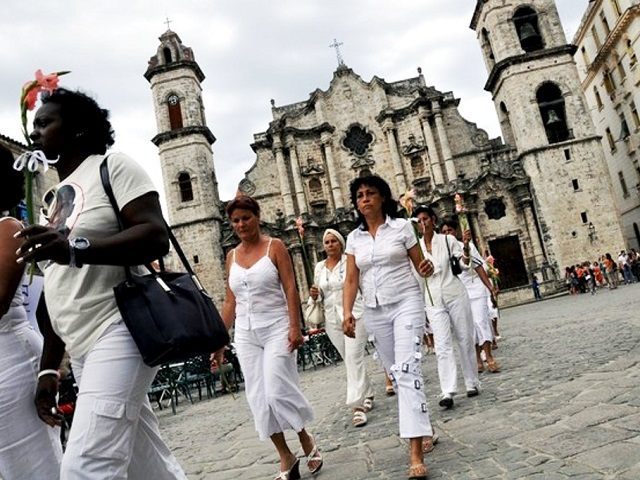The island of Cuba has been rightly seen as the last major stronghold of real Marxism in the world, but as Communism loses its grip, the long atheistic winter seems to be giving way to a springtime of spirituality.
When Cuban President Raúl Castro visited Pope Francis in Vatican City last month, he astounded everyone by saying that he intends to be present for all of the Pope’s Masses during his upcoming visit to the Island, and that he reads all the Pope’s addresses.
“If he continues this way, I will return to the Catholic Church,” Castro said. “Even if I am a member of the Communist party that doesn’t allow believers, we are moving forward.”
According to the Washington Post, Cuba has experienced a sort of “religious revival” in the past 25 years, as the downfall of Soviet totalitarianism has left an ideological vacuum crying to be filled.
For decades, Cuba enjoyed the generous moral and financial support of the Soviet Union. But when communism collapsed in Moscow in 1989, Cubans found themselves suddenly on their own to confront the deficiencies of their system, as well as the atheistic ideology that upheld it.
Though predominantly Roman Catholic, Cuba has never had the deep piety of other Latin American nations, and though nearly 90% of the population was nominally Catholic prior to the Castro revolution, practicing Catholics were close to 10%. Now a gradual lessening of political repression of the Church has led to a heightened interest in spirituality.
Based on baptismal records, the Catholic Church estimates that 60% of the Cuban population is Catholic. It was not until the visit of Pope John Paul II to the island in January 1998 that relations between the Cuban government and the Catholic Church began to change significantly. During the visit, Pope John Paul celebrated Mass in José Martí Square in Havana, with close to a million people in attendance.
During the Mass, the Pope challenged Cuba’s communist government by saying that some ideological systems “presumed to relegate religion to the merely private sphere, stripping it of any social influence or importance,” and insisting that “a modern State cannot make atheism or religion one of its political ordinances.”
Despite stringent state controls, the Catholic Church is Cuba’s only significant independent institution, which places it in a unique position to influence Cuba’s future. The Church is not permitted to run its own elementary or high schools or to broadcast on television or the radio, and public acts of worship are forbidden. Worse still, the Cuban government has typically used Sunday Mass as a weekly venue to arrest “dissidents,” actively targeting Catholics who dare practice in the open, which has undoubtedly contributed to a diminished religious practice in the country.
Nevertheless, the church does publish its own magazines, hosts lecture forums and organizes MBA courses for aspiring entrepreneurs. The archbishop of Havana, Cardinal Jaime Ortega, has negotiated directly with the government for the release of political prisoners.
In August 2014, Cuba’s communist regime approved the construction of the first new Catholic church on the island since the 1959 Revolution, which banned public displays of religiosity, considering them antithetical to Marxism.
At the time, the BBC reported that Cuba’s “attitude to religion has softened since the fall of the Soviet Union,” though the Cuban government still persecutes the faithful regularly, if not as aggressively, as in the 1960s.
Some speculate that the party’s gradual loosening of its iron control of church activities may come from the realization that new values are needed to inject hope into Cuban culture. Fidel Castro ignited a media firestorm in 2010 when he quipped: “The Cuban model doesn’t even work for us anymore.”
Cuban youth seem disillusioned with the dearth of values in Cuban society, a worrisome phenomenon perceived by both religious and political leaders. Catholics and Protestant Christians are trying to take advantage of the spiritual hunger they witness to preach the gospel.
“We are living in a society that has lost its values,” said Yoel Guevara, a 32-year-old evangelical pastor. “Christ gives them back.”
Other Christian denominations are also experiencing a resurgence. The bishop at the Methodist Church of Marianao in Havana, Rev. Ricardo Pereira, said his church has gone from fewer than 400 members in the late 1990s to more than 3,200 today, which has required a multiplication of worship services on Sundays to accommodate them all.
Along with resistance from the government, Christians must also deal with the internal problem of Santería, a syncretistic Afro-Caribbean religion based on Yoruba beliefs, which is often mixed together with Catholic practices. The communist party has always looked upon Santería with less hostility than Catholicism, in large part because it was never the ideological rival for allegiance that party members saw in the Catholic faith.
Where this all will lead is still unclear. The fall of communism in the Soviet Union did not bring about a spiritual revolution in Russia, and the populations of the ex-Soviet republics are still struggling to find their soul, in part because of the collusion of the Russian Orthodox Church with the Communist Party. Once lost, trust is hard to regain.
Poland, on the other hand, emerged from its communist period with renewed spiritual intent and a rediscovery of its Christian roots. Invigorated by the pope who claimed Poland as his homeland, the compatriots of Saint John Paul II were able to reaffirm their culture and their religious faith.
With the upcoming visit of history’s first Latin American Pope–one who enjoys immense popularity and influence–it is perhaps not unreasonable to ask whether Cuba could eventually become the next Poland.
Follow Thomas D. Williams on Twitter @tdwilliamsrome

COMMENTS
Please let us know if you're having issues with commenting.